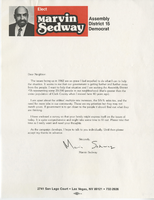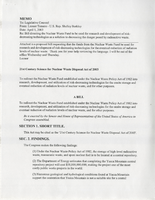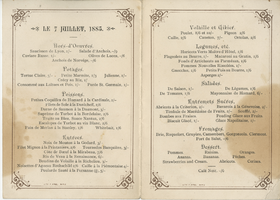Search the Special Collections and Archives Portal
Search Results
Regional subject files, 1859, 1908, 1970-2015
Level of Description
Scope and Contents
The regional subject files include materials collected by anthropologist Katherine Spilde about Native American gaming, Native American communities in the United States, and the US and international gaming industries. The materials date from 1859 to 2015, with the bulk of materials dating from 1990 to 2010. Materials dating from the nineteenth and early twentieth centuries are a reproduction of a federal treaty and an ethnohistorical essay. The majority of the materials document Native American gaming following the passage of the 1988 Indian Gaming Regulatory Act. The papers include research and subject files created by Dr. Spilde during her employment with the National Gambling Impact Study Commission (NGISC), National Indian Gaming Association (NIGA), and Harvard Project on American Indian Economic Development (HPAIED). The materials document Native American gaming enterprises both on and off reservations, the socioeconomic impact of gaming, the political history of gaming in the US, and international gaming. The series includes socioeconomic reports, testimonies, correspondence, memos, press releases, photographs, audiovisual materials, promotional materials, brochures, fact sheets, summaries, booklets, pamphlets, advertisements, tourism materials, journal articles, legal briefs, legislative documents, court opinions, notes, presentations, conference materials, periodicals, community newspapers, and newspaper articles.
The collection contains documentation on a number of Native American nations, including the Misi-zaaga'iganiing Anishinaabeg (Minnesota Chippewa Tribe, Mille Lacs Band); Gaa-waabaabiganikaag Anishinaabeg (Minnesota Chippewa Tribe, White Earth Band); Forest County Bodéwadmi (Forest County Potawatomi Community); Ho-Chunk Nation of Wisconsin; Mashantucket Pequot Indian Tribe; Mohegan Tribe of Indians; Tulalip Tribes of Washington; Sisseton-Wahpeton Oyate of the Lake Traverse Reservation; Standing Rock Sioux Tribe of North and South Dakota; Mandan, Hidatsa, and Sahnish (Arikara) (Three Affiliated Tribes of the Fort Berthold Reservation, North Dakota); and Mississippi Band of Choctaw Indians. Other communities are also represented in the series, but to a lesser extent. In addition to materials about gaming and casinos, Dr. Spilde also collected documents, photographs, and audiovisual materials about Native American culture in general. The series documents regional and national trends in Native American gaming, and the greater gaming industry. Materials trace federal and state relationships with individual Native American nations, specifically concerning gaming enterprises.
Archival Collection
Pagination
- Previous page ‹‹
- Page 4
Archival Component



Juliana Chen oral history interview: transcript
Date
Archival Collection
Description
Oral history interview with Juliana Chen conducted by Cecilia Winchell and Stefani Evans on March 21, 2021 for Reflections: The Las Vegas Asian American and Pacific Islander Oral History Project. In this interview, Juliana Chen shares her upbringing in Hunan, China and her experiences as a teenager training to become a professional ballet dancer. She discusses her rigorous training and troupe career that ended when Chen sustained a knee injury. With a desire to try something new while still being able to perform, Chen immigrated to Vancouver, Canada and began practicing magic. Chen shares that although she didn't know anyone or speak English, she practiced her craft and broadened her knowledge by joining professional organizations including the International Brotherhood of Magicians. After winning several magic competitions, Chen performed on the Las Vegas Strip at Caesar's Palace and the Riviera Hotel and Casino. She shares her current professional pursuits, her connection to the Las Vegas magician community, and her thoughts on Chinese culture and cuisine.
Text
Cork Proctor Photograph Collection
Identifier
Abstract
The Cork Proctor Photograph Collection (1960s-1980s) primarily contains black-and-white photographic reproductions of early Las Vegas, Nevada; the Cal-Neva Lodge at Lake Tahoe, Nevada; and various celebrities. The collection also includes black-and-white photographic prints of the Helldorado Parade. Cork Proctor was a comedian who performed throughout Nevada and the United States.
Archival Collection
Willard H. George Furrier, Ltd. Scrapbooks
Identifier
Abstract
The Willard H. George Furrier, Ltd. Scrapbooks are comprised primarily of three leatherbound scrapbooks containing black-and-white and sepia toned photographs taken from the 1920s through 1955. The scrapbooks feature actresses from Hollywood, California wearing furs designed and created by furrier Willard H. George. Actresses of note include Lucille Ball, Rita Hayworth, and Greta Garbo.
Archival Collection
Corbin Harney Nevada Test Site Protest Photograph Albums
Identifier
Abstract
The Corbin Harney Nevada Test Site Protest Photograph Albums (1995-1997) are comprised of three photograph albums documenting the life and spiritual, environmental, and political activism work of Corbin Harney, elder and spiritual leader of the Newe ("the People") Western Shoshoni Indians. The majority of the photographs are focused on the anti-nuclear protest demonstrations by the Shundahai Network at the Nevada Test Site during the 1990s.
Archival Collection
Rancho High School Class of 1962 Collection
Identifier
Abstract
The Rancho High School Class of 1962 Collection (1956-2017) consists of materials donated by students of Rancho High School in Las Vegas, Nevada. The collection contains school event clippings, newspaper clippings, scrapbooks, pamphlets, physical and digital photographs, and school jackets and sweaters. Additionally, the collection chronicles the lives of many students after graduation through school reunion documentation from the 1970s to 2017. The collection also includes planning files for class reunion celebrations including the 40th, 50th, and 55th reunions.
Archival Collection


